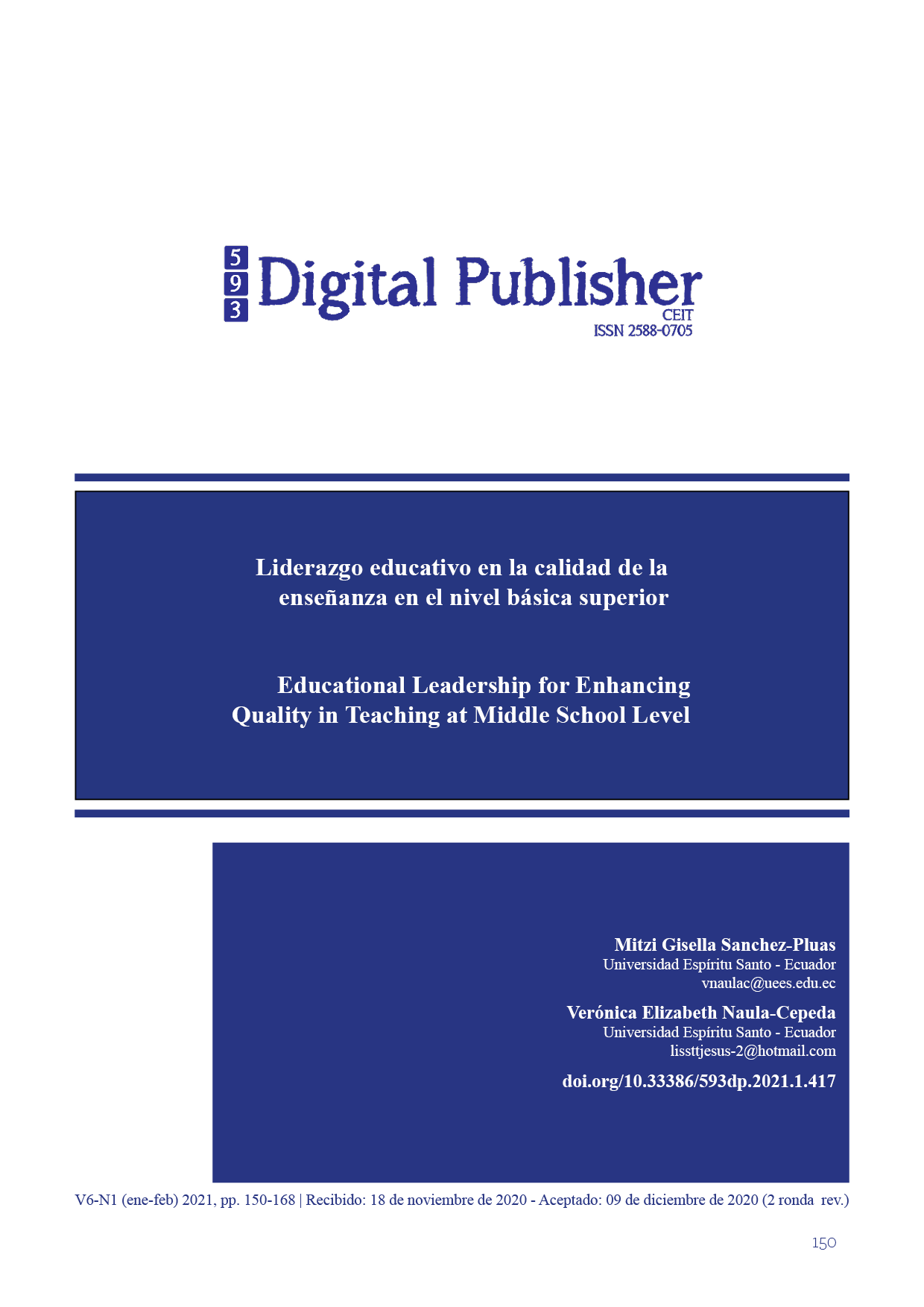Liderazgo educativo en la calidad de la enseñanza en el nivel básica superior
Contenido principal del artículo
Resumen
En este trabajo se plantea aportar una estrategia innovadora desde la perspectiva del liderazgo educativo que influya en la calidad de la enseñanza en el nivel básica superior, para así lograr un aprendizaje innovador con la aplicación de métodos y técnicas de aprendizaje, con el uso de las TICS. Se emplearon métodos científicos tanto empíricos como teórico, el histórico lógico, observación, la encuesta, entrevista el método deductivo e inductivo y el método descriptivo correlacional. Parte relevante de la investigación es poder implementar estrategias innovadoras por parte de los directivos y docentes para la enseñanza aprendizaje de los estudiantes. La estrategia es trabajar con las Tics como eje interdisciplinario en todas las áreas del conocimientos, ya que les permitirá a los estudiantes desarrollar competencias informáticas, es decir, el sistema de conocimientos, habilidades y destrezas para utilizar los recursos tecnológicos como un técnica de aprendizaje y mejoramiento en el rendimiento académico, se vuelve una necesidad imperiosa utilizar los recursos tecnológicos en el proceso de enseñanza-aprendizaje, para elevar la calidad educativa a través del desarrollo colaborativo e interactivo de los educandos, es por ello la importancia que tiene la presente propuesta ya que orienta al desarrollo de las asignaturas básicas, lo que permitirá que se logre un aprendizaje significativo.
Descargas
Detalles del artículo

Esta obra está bajo una licencia internacional Creative Commons Atribución-NoComercial-CompartirIgual 4.0.
1. Derechos de autor
Las obras que se publican en 593 Digital Publisher CEIT están sujetas a los siguientes términos:
1.1. 593 Digital Publisher CEIT, conserva los derechos patrimoniales (copyright) de las obras publicadas, favorece y permite la reutilización de las mismas bajo la licencia Licencia Creative Commons 4.0 de Reconocimiento-NoComercial-CompartirIgual 4.0, por lo cual se pueden copiar, usar, difundir, transmitir y exponer públicamente, siempre que:
1.1.a. Se cite la autoría y fuente original de su publicación (revista, editorial, URL).
1.1.b. No se usen para fines comerciales u onerosos.
1.1.c. Se mencione la existencia y especificaciones de esta licencia de uso.
Citas
Abreu, J. (2016). Metodología de la investigación. Madrid: CreateSpace Independent.
Aguirre, B. (2015). Creación de un e-book para la enseñanza aprendizaje de lengua y literatura en noveno año de educación general básica. Machala: Universidad Técnica de Machala.
Álvarez, J. T. (2016). Diagnosis of educational leadership in higher Education Institutions Valley Toluca. Revista de Investigación Educativa, 51-68.
Araiza, M. d. (2012). El Liderazgo Educativo y Las Competencias Tecnológicas Como Generadores del Cambio. México: International Journal of Good Conscience.
Arosemena, C. (2013). Herramientas web en la enseñanza de lengua y literatura. Guayaquil: Universidad Católica de Santiago de Guayaquil.
Arteaga, F. (2016). QR académico: una propuesta didactica emergente con apropiación de la cultura juvenil. Revista Venezolana de Información, Tecnología y Conocimiento, 40-55.
Baena, G. (2014). Metodología de la investigación. México: Editorial Patria.
Bentes, J., Ortiz Bravo, L. H., & Cuadra Hernandez, F. A. (2017). Las TIC en la Integración curricular transversal en el quehacer educativo. Conhecimento Diversidade Niterói, 50-51.
Bernal, C. (2010). Metodología de la Investigación. Bogotá: Pearson Educación de Colombia Ltda.
Castro, P. (2019). Liderazgo educativo y su influencia en el nivel académico. Piura-Perú: Universidad César Vallejo.
Cegarra, J. (2011). Metodología de la investigación cientpifica y tecnológica. Madrid: Ediciones Diaz de Santos.
Chávez, J. M. (2014). Liderazgo Educativo, Un Reto Constante En Educación Superior.
International Journal of Good Conscience, 119-126.
Cifuentes, G. (2016). Conceptualizando prácticas de Liderazgo de las Tic: Un Estudio en la Educación Superior Colombiana. Archivos Analíticos de Políticas Educativas, 1-13.
Corrales, A. (2016). Gestión de liderazgo y valores en la administración del centro educativo.
Quito: Universidad Técnica Particular de Loja.
Cruz, C. (2017). La gestión de los directivos y la calidad del servicio educativo del Colegio San Antonio Marianistas. Lima-Perú: Universidad Nacional Mayor de San Marcos.
Díaz, V. (2009). Metodología de la investigación científica y bioestadística. Santiago: RIL ediciones.
Franco, M. (2018). El liderazgo directivo y su relación en la gestión educativa de instituciones.
Piura-Perú: Escuela de Posgrado, Universidad César Vallejo.
García, C. (2018). Perspectivas del impacto en el liderazgo educativo y la calidad del siglo XXI .
México: Universidad SPENTA, Monterrey N.L, México.
García, J. (2013). Estudios Sociales. Lengua y Literatura. Esmeraldas: Universidad Andina Simón Bolívar.
Hernández, A. (2018). Metodología de la investigación científica. Manabí: Universidad Estatal del Sur de Manabí.
Hernández, R. F. (2014). Metodología de la Investigación. México: McGraw-Hill/Interamericana Editores, S. A. de C. V.
Iris A. Jiménez-Pitre, R. J. (2017). Escuela de Gobierno basada en TIC: Determinante para la Accesibilidad e Integralidad del Empoderamiento Digital. Información Tecnológica, 76.
Jimenez Pitre, I., Martelo, R., & Jaimes, J. (2017). Escuela de Gobierno basado en TIC: Determinante para la Accesibilidad e Integralidad del EmpoderamientoDigital. Información Tecnológica, 76-77.
Jiménez, J. (2017). Una mirada hacia la calidad de la Educación Primaria en Baja California, México: Marginación Escolar y Equidad en sus Resultados. Revista Iberoamericana sobre Calidad, Eficacia y Cambio en Educación, 35-48.
López, J. (2018). El fenómeno del liderazgo en los centros educativos. Revista Internacional de Educación y Aprendizaje, 165-176.
Maureira, Ó. (2018). Educational Leadership Practices: An Evolutive and Illustrative View From its Main Approaches, Dimensions and More Representative Indicators. Universidad Católica Silva Henríquez, Chile, 1-33.
Maureira, Ó. G. (2016). Remodeling the sense of leadership within contemporary school organizations: Distributed leadership perspective. Revista Complutense de Educación, 689-706.
Mineduc, M. d. (2017). Estándares de aprendizaje. Quito: Mineduc.
Miraida, J. (2018). Impacto social de la práctica pedagógica del docente en formación en educación primaria. Santiago 139, 175-184.
Muñoz, R. (2016). Metodología de la investigación. México: Editorial Prgreso S. A. .
Paz, C. (2011). Liderazgo de los directivos docentes en contextos vulnerables. Educ.Educ. Vol. 14, 389-409.
Pedraja, L. (2012). Los estilos de liderazgo y la gestión de recursos humanos: una reflexión acerca del impacto sobre el desempeño de los estudiantes en la educación media. Revista chilena de ingeniería, 376-385.
Reza, F. (2015). Ciencia, metodología e investigación. México: Imagen editorial.
Rodríguez, G. (2011). Funciones y rasgos del liderazgo pedagógico en los centros de enseñanza.
Educ.Educ. Vol. 14, 253-267.
Ruiz, J. (2012). Metodología de la investigación cualitativa. Silbao: Universidad de Deusto. Sarasola, M. (2015). Evaluando el liderazgo educativo centrado en los aprendizajes del alumnado.
Universidad de Deusto – España, 121-139.
Tiapanta, A. (2017). El nuevo currículo educativo de lengua y literatura y los estándares de aprendizaje de los estudiantes. Ambato: Universidad Técnica de Ambato.
Torche, P. (2015). ¿Qué es “educación de calidad” para directores y docentes? Calidad de la Educación, 103-135.
Valdés, S. (2018). La calidad de la educación y su relación con los niveles de crecimiento económico de México. Economía y Desarrollo, 61-79.
Villa, A. (2019). Liderazgo: una clave para la innovación y el cambio educativo. Revista de Investigación Educativa, 301-326.
Yao, F. (2015). Los factores que influyen en la calidad de la educación. Itinerario Educativo, 217- 225.



